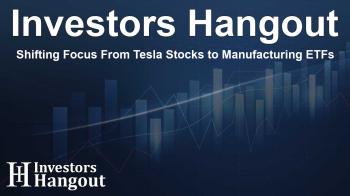Shifting Focus From Tesla Stocks to Manufacturing ETFs

Understanding the Current Landscape of Tesla and ETFs
The sensational delivery numbers reported by Tesla, Inc. (NASDAQ: TSLA), with an impressive 7.4% increase from the previous year, have rekindled interest among investors. This resurgence coincides with a noticeable shift in the electric vehicle (EV) market as the dust settles from last year’s dramatic changes, leading many to reflect on the sustainability of such growth.
Demand Instigated by Financial Incentives
It is vital to analyze the broader picture behind Tesla’s recent success. Much of this surge can be attributed to the expiration of the U.S. federal EV tax credit, which had sparked a last-minute rush in EV purchases. It is noteworthy that analysts suggest this uptick was more a result of temporary demand stimulated by subsidies rather than a sustainable recovery in the market itself.
ETF Performance Amidst Tesla's Challenges
The challenges posed by waning subsidies and growing competition, especially from international automakers, greatly affect Tesla-heavy ETFs like the Simplify Volt TSLA Revolution ETF (NYSE: TESL) and others with direct exposure to Tesla. The TESL has seen impressive growth, nearing a 22% rise over the year, yet there are concerns regarding future performance trends.
Alternative Investments in Manufacturing ETFs
Amid these troubling signals for pure Tesla stocks, savvy investors are pivoting towards more stable investment options found in manufacturing-oriented ETFs. ETFs such as the iShares U.S. Manufacturing ETF (NYSE: MADE) and Invesco S&P 500 Pure Value ETF (NYSE: RPV) have emerged as viable contenders, providing returns of 42% and 20% over the past six months, respectively.
Legacy Automakers Positioning Themselves for the Future
These manufacturing ETFs incorporate stocks of established players like General Motors Co (NYSE: GM) and Ford Motor Co (NYSE: F), both of which are balancing the volatility associated with EVs through their profitable legacy combustion-engine vehicles. This balance ensures that they maintain financial stability while adapting to the changing landscape.
The Stability of Traditional Players
Within the current market volatility, there is an increasing trend toward value-oriented investments. Traditional automakers are gaining traction as consumers and investors alike seek out stability amidst technological shifts. Tesla’s ongoing difficulties open the door for legacy brands to bolster their market positions.
Looking Ahead: ETF Investment Strategies
For investors eyeing long-term growth with a touch of caution, looking into manufacturing ETFs provides a pathway to diversified investments while capitalizing on the ongoing shifts in consumer preferences toward sustainable transport solutions.
Conclusion: Embracing Change Through Smart Investments
As Tesla navigates its way through an uncertain future, fueled by the fading impact of subsidies and stiff competition, the ETF landscape is shifting towards a more sustainable model rooted in established manufacturing practices. For those willing to explore, the movement towards investing in solid, stable sectors opens up various pathways for prudent financial growth.
Frequently Asked Questions
What are the primary challenges facing Tesla currently?
Tesla faces challenges from waning subsidies, increased competition from overseas automakers, and potential market saturation.
How have manufacturing ETFs performed recently?
Manufacturing ETFs like MADE and RPV have reported returns of 42% and 20%, highlighting strong growth and investor interest in these sectors.
Which companies are included in value-oriented ETFs?
Value-oriented ETFs often include stocks from well-established companies such as General Motors and Ford, which balance traditional vehicle sales with emerging EV technologies.
What is causing the current investor shift from Tesla stocks?
Investors are looking for stability and long-term growth amidst the uncertainties surrounding Tesla's performance and the EV market's sustainability.
Can manufacturing ETFs be a good investment strategy?
Yes, manufacturing ETFs can be an effective investment strategy for those seeking stable returns as they are positioned to benefit from evolving market dynamics.
About The Author
Contact Kelly Martin privately here. Or send an email with ATTN: Kelly Martin as the subject to contact@investorshangout.com.
About Investors Hangout
Investors Hangout is a leading online stock forum for financial discussion and learning, offering a wide range of free tools and resources. It draws in traders of all levels, who exchange market knowledge, investigate trading tactics, and keep an eye on industry developments in real time. Featuring financial articles, stock message boards, quotes, charts, company profiles, and live news updates. Through cooperative learning and a wealth of informational resources, it helps users from novices creating their first portfolios to experts honing their techniques. Join Investors Hangout today: https://investorshangout.com/
The content of this article is based on factual, publicly available information and does not represent legal, financial, or investment advice. Investors Hangout does not offer financial advice, and the author is not a licensed financial advisor. Consult a qualified advisor before making any financial or investment decisions based on this article. This article should not be considered advice to purchase, sell, or hold any securities or other investments. If any of the material provided here is inaccurate, please contact us for corrections.

